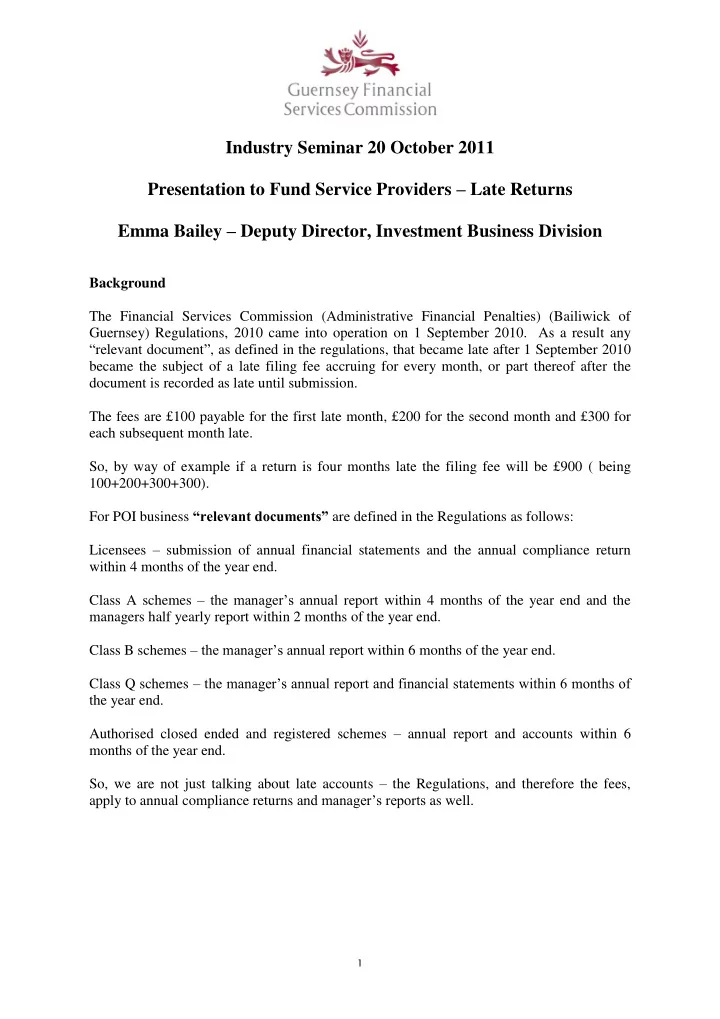

Industry Seminar 20 October 2011 Presentation to Fund Service Providers – Late Returns Emma Bailey – Deputy Director, Investment Business Division Background The Financial Services Commission (Administrative Financial Penalties) (Bailiwick of Guernsey) Regulations, 2010 came into operation on 1 September 2010. As a result any “ relevant document ” , as defined in the regulations, that became late after 1 September 2010 became the subject of a late filing fee accruing for every month, or part thereof after the document is recorded as late until submission. The fees are £100 payable for the first late month, £200 for the second month and £300 for each subsequent month late. So, by way of example if a return is four months late the filing fee will be £900 ( being 100+200+300+300). For POI business “relevant documents” are defined in the Regulations as follows: Licensees – submission of annual financial statements and the annual compliance return within 4 months of the year end. Class A schemes – the manager’s annual report within 4 months of the year end and the managers half yearly report within 2 months of the year end. Class B schemes – the manager’s annual report within 6 months of the year end. Class Q schemes – the manager’s annual report and financial statements within 6 months of the year end. Authorised closed ended and registered schemes – annual report and accounts within 6 months of the year end. So, we are not just talking about late accounts – the Regulations, and therefore the fees, apply to annual compliance returns and manager’s reports as well. 1
Process I thought it would be useful to give a little bit of detail on our internal processes so you know what to expect when you submit an annual return to IBD and what to expect if you fail to submit your return on time. Accounts, reports and annual compliance returns should be submitted by email via the designated email addresses. These are as follows: IBDLicenseeAccounts@gfsc.gg IBDFundAccounts@gfsc.gg An automated confirmation of receipt email is returned to each submission to these email boxes. If you do not receive this then something has gone amiss. The accounts are then uploaded on to our system. When one element (or more) of the return is not received within the given time frame the system notes this and a standard email reminder is sent to the named contact at the Licensee, or if a fund, the administrator reminding them that the return has become late and a filing fee is accruing. At all times it remains the responsibility of the regulated entity to submit the relevant documents on time – whether you receive the email reminder or not. The fee is not invoiced until the late filing has been received by the Commission. The Regulations do not allow for discretion therefore the Commission is not able to waive fees already accrued, or provide derogations from Regulations, no matter how good the excuse!! For example, in the past we’ve been told the auditor hasn’t completed the audit on time or the assets take a long time to value. These are all issues you need to plan for out ahead of your year end to ensure the return is submitted on time. The exception here is where IBD is also regulated by another division and the Commission has provided written confirmation that the entity may submit their accounts within the lead division’s timeframe w here it differs from IBD. Statistics Since the introduction of the Regulations the Commission has noted an apparent improvement in the timeliness of the submission of accounts and annual returns however, there are still a number that are returned late for various reasons. As at the end of September: Overall there have been approx 47 late filings for licensees since the introduction of the regulations with 13 filings for licensees were outstanding; There have been 29 late filings for open ended funds and 8 of these were outstanding; and 2
There have been 39 late filings for closed ended funds and 15 of those were outstanding. Helpful hints and tips Finally, as this is a relatively new process I thought it would be helpful to let you know some of the issues we come across. The system is not foolproof – we receive (or should receive) more than 1,500 accounts submitted to us every year (and this does not include the 325 non-Guernsey schemes and the half yearly accounts that are not subject to the regulations). We also have some funds submitting separate accounts for each sub-fund. This amounts to a LOT of documents. There are some things that licensees can do to assist us in sorting and recording those documents: Submit soft or scanned copies to the designated email address rather than submitting hard copies where possible. The relevant email addresses can be found on our website in the “Returns” section. Get the name of the regulated entity correct in your email. If the name has changed during the period since the accounting year end please indicate this. If accounts are submitted per sub-fund please include the name of the authorised fund. If the submission is being made piecemeal, e.g. the accounts are being submitted by a different person than then annual compliance review please state this in the email to assist us in matching the two documents up. If you do send in a piecemeal return note that the late filing fee still applies if the return is partially complete. It is useful to receive notifications that annual returns are going to be late however, please note you are still likely to receive an email reminding you that the return is late and a fee is accruing as this email is system generated. Please use your GFSC reference number on all correspondence with the Commission including the submission of accounts. 3
Recommend
More recommend